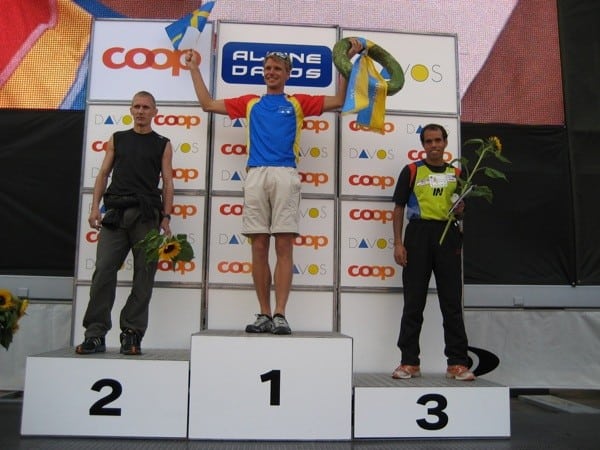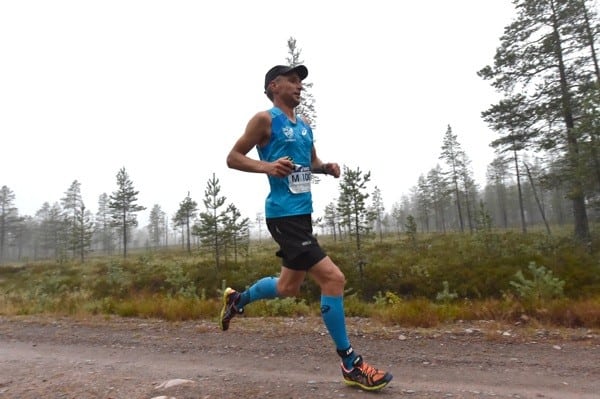Jonas Buud is a name that’s popped up multiple times on podiums of some of the greatest ultra races over the last few years. I tracked down Jonas to his hometown of Mora, Sweden to get the low-down on his running journey.

Jonas Buud earning second at the IAU 100k World Championships for the fourth time. Photo: iRunFar/Bryon Powell
iRunFar: Jonas, you live in Mora in the middle of Sweden, tell me about the area, what the nature and landscape is like there, how large it is?
Jonas Buud: In the area around Mora there are around 20,000 people and the town itself lies about 300km away from Sweden’s capital city — Stockholm. There’s a lot of forest and some lovely long trails to run on. The highest mountain is 500m, but the town itself is situated 160 meters above sea-level.
iRunFar: Mora is famous for Vasaloppet, the worlds largest cross country ski race with almost 60,000 people competing in one of the races during the Vasa week. Growing up there, how much is the race a part of the city’s culture?
Buud: There is, without doubt, a lot of things that are connected to Vasaloppet in around Mora. There’s also a summer series of events now, too, that stretches out over a week and gets over 30,000 people taking part — it’s for both running and MTB. It’s as simple as this — if you’re active in some organisation in Mora, you’re going to help out with the events. It doesn’t matter what age you are.
iRunFar: Was there any indication when you were a kid that you had a talent for endurance sports?
Buud: Maybe… I certainly liked to run, do orienteering, and to ski when I was young — although I was not particularly good. There wasn’t a big running tradition in Mora at that time, so the running club wasn’t so active. So I did some orienteering in the summer months and cross-country skiing during the winter up until I was 15. Then, from 15, it became mostly orienteering — the skiing became pretty much just a part of my training for orienteering.
iRunFar: Apart from sports, what other things did you get up to when you were a kid; what is the typical Mora youngster into growing up?
Buud: In Mora, people cross-country ski — that’s just how it is.
iRunFar: Let’s talk a little about running — you were pretty late coming into the sport and ran your first marathon in NYC ten years ago — tell me about how your journey into running began?
Buud: The reason I ran the marathon in New York was that I was going to visit a friend in Colorado — it suited my schedule to also try and run a marathon during the trip! My plan had been to run the Stockholm Marathon in the spring, but I became sick before the start. So it was New York instead — before the race, the longest I’d run was 35km. I especially remember one weekend when I’d decided to run some longer distances. My plan was to run 25km on the Saturday and then 25km on the Sunday. That plan went out the window when I got a pain in my calf after 7km on the Sunday and I had to limp back home. Back then, I thought that 25km was a long run, but now 25km is a pretty ‘normal’ session that I can run a good few days in a row.
iRunFar: So how did it go in NYC?
Buud: I had no idea about what kind of time I should aim for in New York. I’d talked a little with my orienteering friends and asked them what they thought I could run a marathon in. After some guesswork, I decided that I’d give 2:40 a go. When I started the race, I didn’t have a big master plan, I just thought I’d run at a pace that felt pleasant. The kilometres rolled along really nicely and when I got close to the 30km mark, I was waiting to ‘hit the wall.’ Everybody had talked about the last ten kilometres being really tough, but I discovered that I could just continue running at the same speed as earlier and I started passing loads of other runners. I made it to Central Park and the finish in 2:36. Running that first marathon in New York was absolutely fantastic — so much so, that I ran two more times there.
iRunFar: So those races obviously had a bearing on you continuing along the road towards ultras, too, right?

Jonas at the finish line of his first marathon in New York. The journey begins!
Photos courtesy of Jonas Buud
Buud: Well, New York Marathon was also the place where I met a running coach who thought that I should follow them out to Portugal for a running camp. So in Spring 2005, I headed off to Portugal for a running camp. It was so much fun and so good that I went to another camp in 2006 for two weeks. It was there that I met Rune Larsson, a well-known Swedish ultrarunner. Rune thought that my background in orienteering and marathon running was interesting and he thought that it would be a good idea for me to go to Davos and run the Swiss Alpine Marathon 78km. I wasn’t so sure, I thought that the marathon was my thing and didn’t really think that running a longer distance was for me.
iRunFar: But something or somebody persuaded you?
Buud: We went back to Portugal again in 2007. That year, Rune decided that he’d try and convince my wife that she should go to Davos and run 78km. She was a little easier to convince than I was and she informed me that she was going to run the Swiss Alpine Marathon 78k and that it would be fun if I’d run the race with her! When all was said and done, I sent in my application and started training by running hills and some longer sessions. Before my first Swiss Alpine, I’d run 50km twice in training. On top of that, my biggest hill has had 200 meters of vert and the total ascent for the Swiss Alpine was 2,600 meters. That meant my training involved a lot of repeats on that hill — I’d usually get in about 1,000 meters vert during my hill sessions.
iRunFar: And history tells us that it was good training Jonas…
Buud: Well, before the start of the race my plan was just to run my own race and not really focus on the other runners. I didn’t really have any bigger goal than getting myself to the finish. At the start, a group of runners just took off. Then, after half the race, I started passing a good few runners and at the summit, with 25km left in the race, there were only two runners in front of me. I was new territory — I’d never run so long before — neither time or distance — in a race or even training. I was a little scared that I was going to start feeling really tired. That tiredness never came, instead I passed the two runners ahead of me and succeeded in winning my first ever ultra. It was then that I became obsessed with ultrarunning.

Standing proud on top of the podium after his first win at the Swiss Alpine Marathon.
Photos courtesy of Jonas Buud
iRunFar: And the start of your love affair with that particular race?
Buud: Yeah, since winning that year in Davos, I’ve added another 7 more wins — I don’t even really understand how that’s possible! After my success there, I got asked if I wanted to run the 100km World Championships.
My first World Championships were far from a success — after 60km I was lying crying on a massage table with quads that felt like telephone poles. I really didn’t want to continue, but I somehow managed to lure myself back onto the course and, eventually, made it to the finish. The year after was better and I took my first World Championship silver and European Championship gold. It’s just rolled on from there pretty well.
iRunFar: So that feeling of waiting for the tiredness to come, a tiredness that never happened… is that when you realised the ultras were for you?
Buud: Yeah, after my first win in Davos. It dawned on me then that ultrarunning suited me quite well.
iRunFar: You’re also involved in organising the UltraVasan, the summer ultra on the famous cross-country ski route. Please tell me the history with getting that race established?

Laying down a Comrade’s marker in 2011.
Photos courtesy of Jonas Buud
Buud: After my first trip to South Africa and Comrades, I thought that the same concept could also work in Sweden. Myself and a colleague, Peter Fredricson, did a presentation for Vasaloppet’s organisation in 2010 about what I’d experienced at the different competitions I’d entered in my travels. At that time, they decided that starting an UltraVasan wasn’t something they wanted to to — they had already started with CykelVasan, the bike race. Then, in winter 2012, we got asked once again if we wanted to show our presentation again for the organisers of Vasaloppet and this time they went for it. The original plan was to do the race the same year, but after a few months we realised that we didn’t have enough time to arrange the event to the world-class standard we aimed for and to attract the very best runners. For that reason, we decided that we’d aim for 2014 instead. So, the 22nd September 2013 we opened registration for 750 places, that was the number we’d aimed for the first year. It sold out in 30 minutes. Then, we knew that the time was right for a new, large ultra in Sweden.
iRunFar: Cool. You’ve won Ultravasan, which is 90km, in 6:02, an incredibly fast time. It looks like you’re going to have some speedy runners showing up this year. Who would you really love to race against on your home turf?
Buud: It’s super exciting that there seems to be a really good field this year too. It would have been even better if some more of the recent winners from Comrades would have shown up!

Jonas on his to winning the inaugural UltraVasan in 2014.
Photos courtesy of Jonas Buud
iRunFar: Ultrarunning has been gaining huge popularity around the world, have you noticed a lot more people getting into ultras in Sweden, too. Tell me a little about how the sport has changed there?
Buud: I’ve certainly noticed that interest has grown during the time that I’ve been running ultras. When I started, eight years ago, it was more like everyone knew everyone that ran ultras in Sweden. Nowadays, you’ll have a lot more new ultrarunners showing up at events. It’s really cool to be involved in the development.
iRunFar: Your results in the last few years are incredible — 2 x European 100k champ, 8 x Swiss Alpine marathon champ, 4 x 2nd places at the 100k World Championships, as well as a 2nd, 4th and 7th at Comrades. Do you ever take the time to really think about the achievements and how successful you’ve been or do you just look ahead to the next race?
Buud: Of course I think back to certain races sometimes — but it’s more likely that after finishing a race, I usually start focussing on the next race and try to get myself prepared in the best way.
I’ll get to look at my medals and prizes when I’ve stepped away from running.
iRunFar: Do you have a philosophical outlook on finishing second at the world championships so many times and also missing out on the Comrades & UTMB win or do you feel like you have unfinished business at those races!?
Buud: Of course, it would have been amazing to win one of the World Championships or Comrades, but, then again, I think that I’ve ran really, really good races when I’ve come second. If you’ve tried your best and are satisfied with that, then the only thing you can do is just congratulate the winner for being faster than you on the day.
